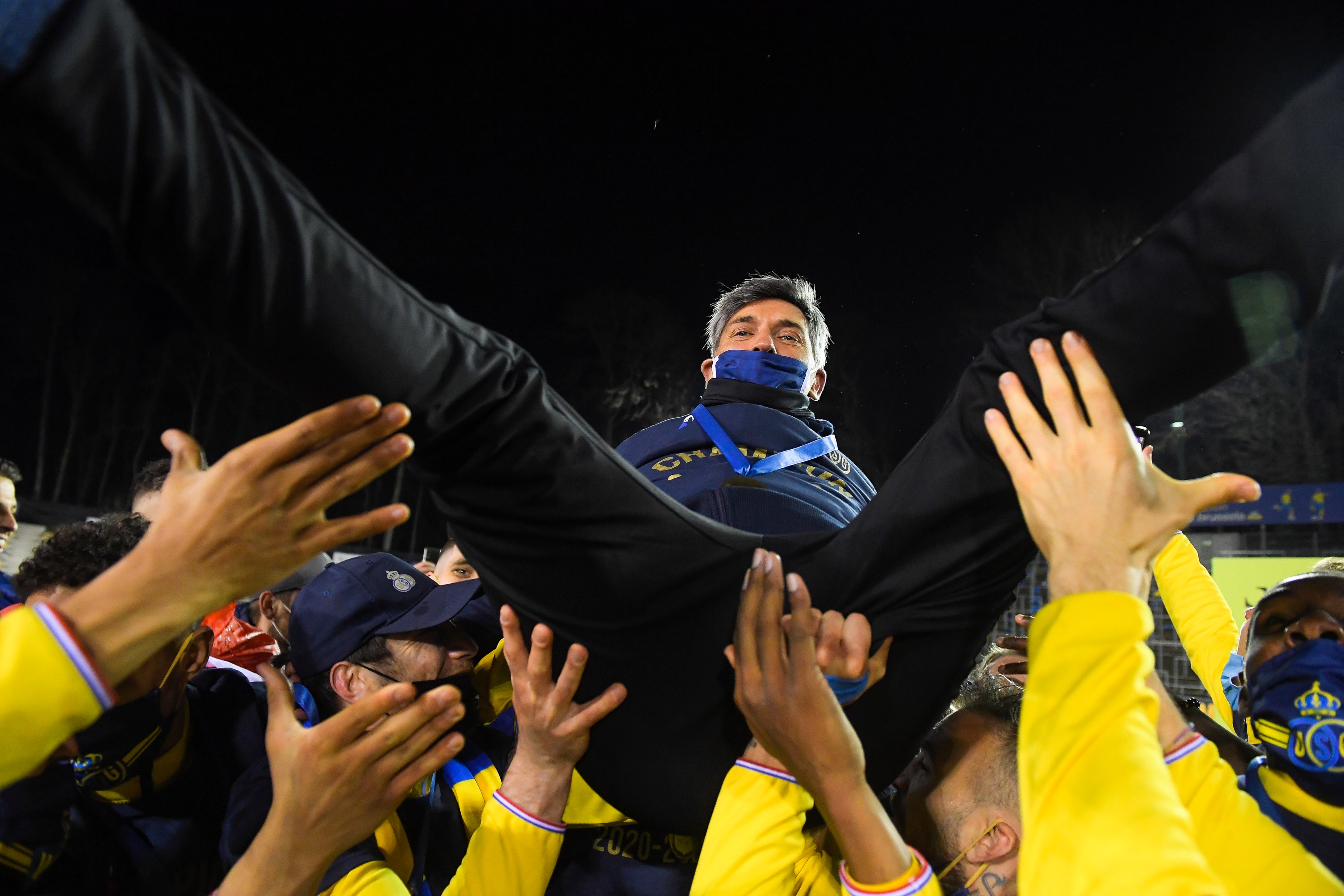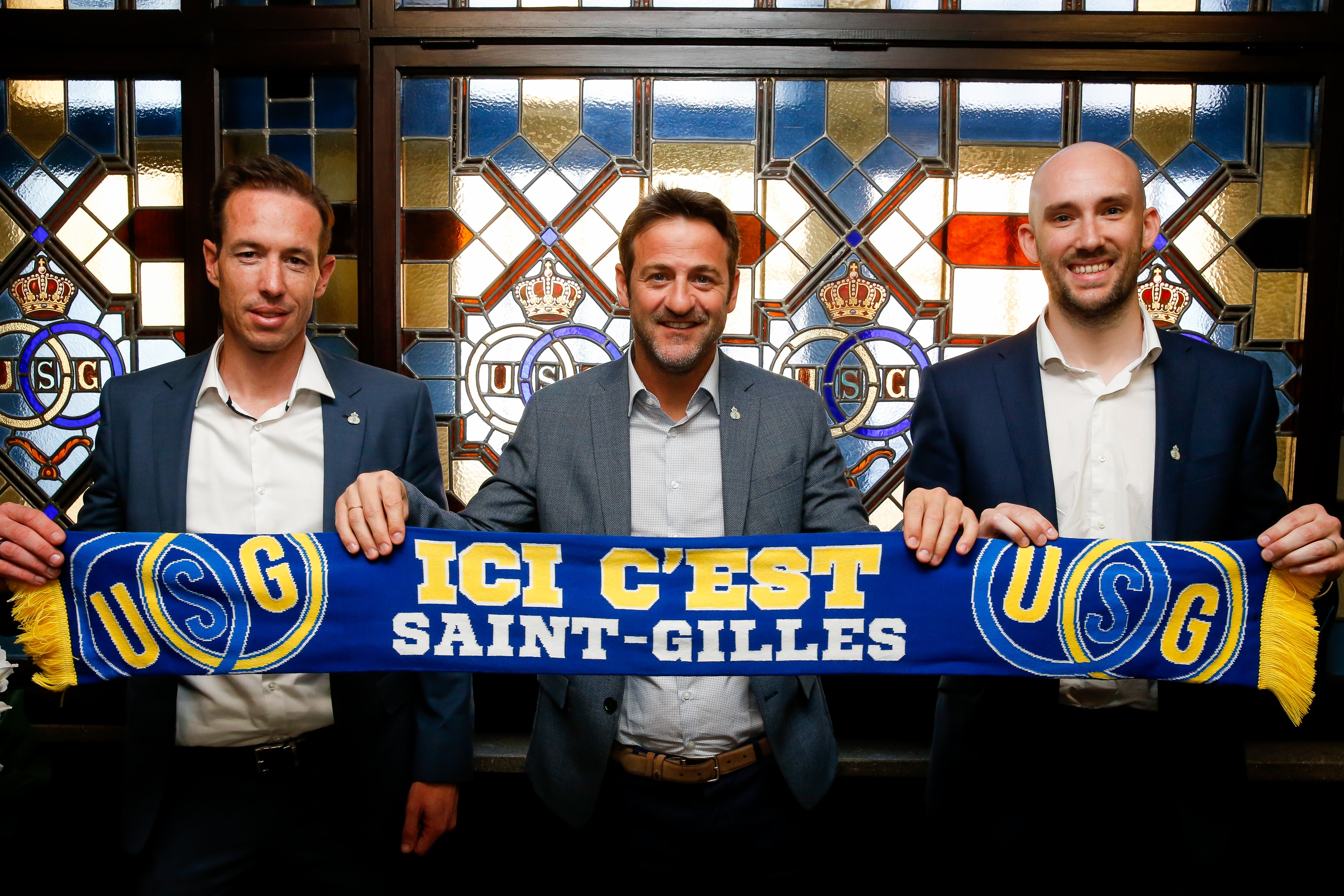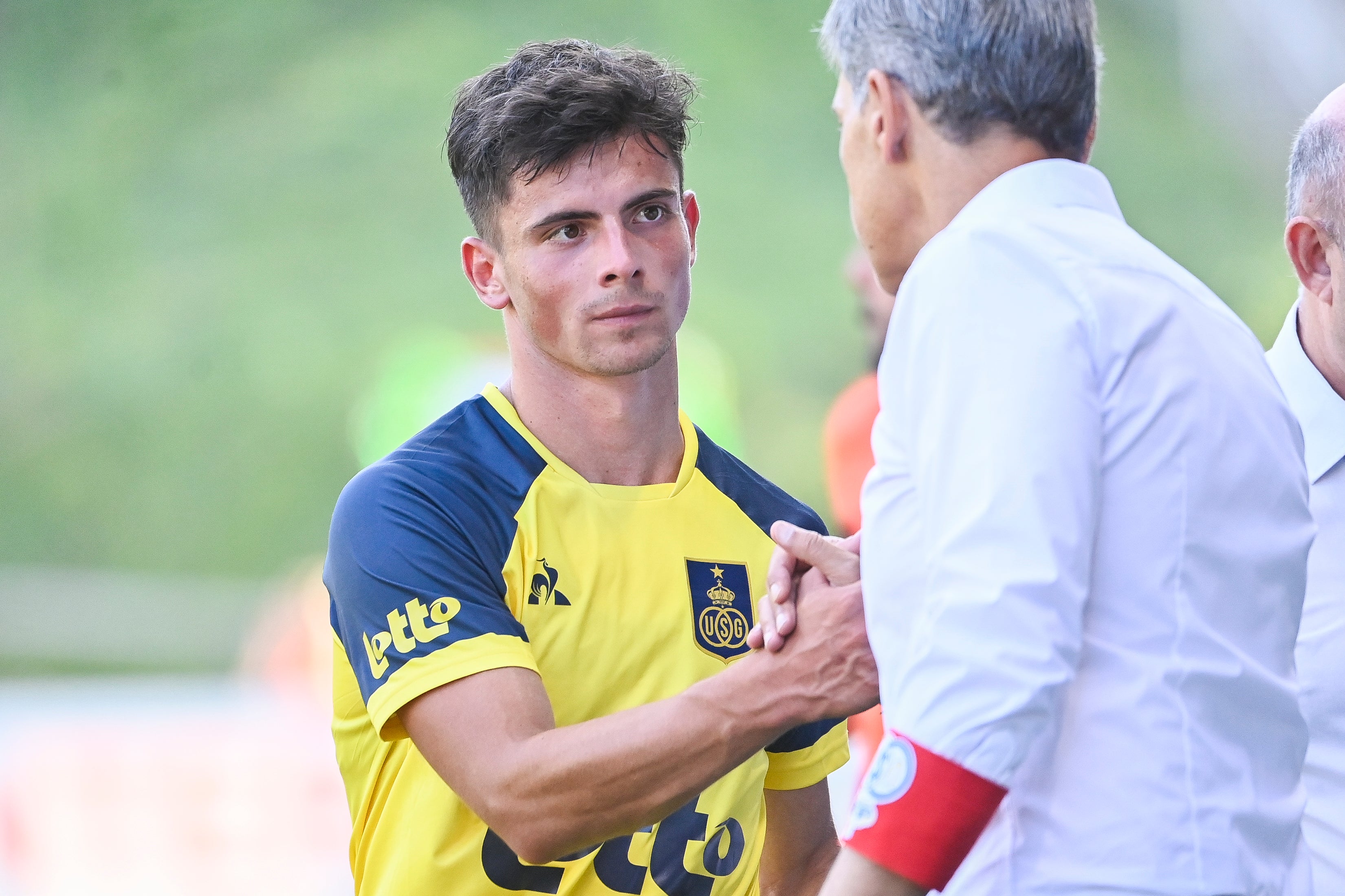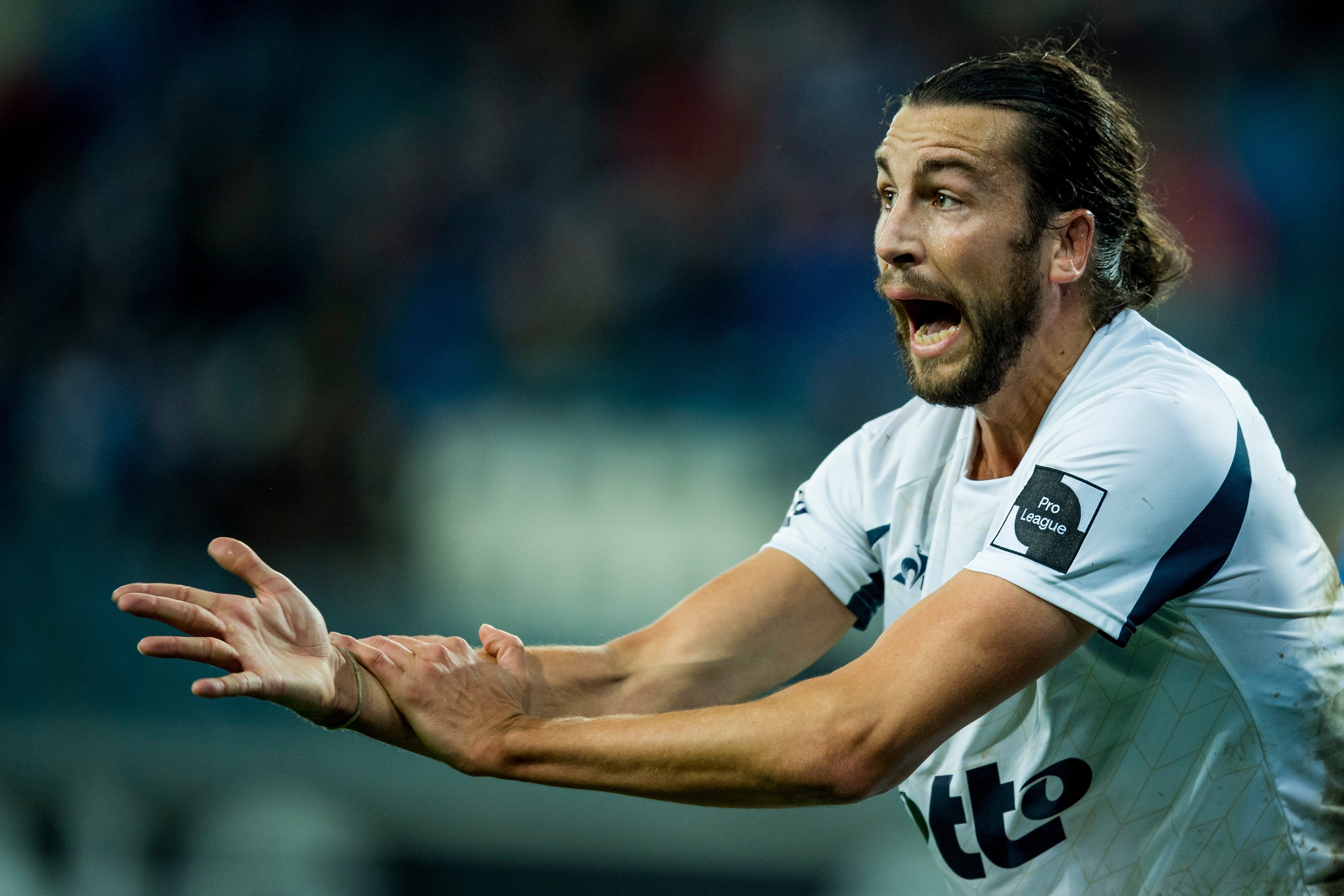Union Saint-Gilloise: How British owners transformed Belgian minnows into improbable league leaders
Bought by Brighton’s Tony Bloom and business partner Alex Muzio, Union SG have revived the glory years of the 1930s as they chase their own Leicester fairytale

In the southwest of Brussels is Anderlecht’s distinctive Lotto Park, home of Belgian football aristocracy: 34 league titles, nine cups, five European trophies. Anderlecht wear purple, the colour of Belgian monarchy, and until last season they had finished in the top six every year since the Second World War.
Just across the canal in the corner of a picturesque park sits a stadium in stark contrast: Stade Joseph Marien, home of Union Saint-Gilloise. It is a place you could easily miss from the street behind a century-old brick facade which hides a handful of doorways. Inside is a relic of a bygone age where exposed terraces are broken up by grassy mounds, and on autumn days like these the few plastic seats are filled with leaves fallen from the surrounding forest.

The old ground fits 8,000, and recently Union have been selling every ticket. Last season they finally returned to the top flight for the first time in 48 years; now they are top of the Belgian Pro League, four points clear of Antwerp and Brugge, 10 above neighbours Anderlecht whom they beat on a raucous opening day. Fans are dumbstruck and delirious in equal measure. It is early days, but this could be a season of Leicester-ish proportions.
***
Three years ago Union were bought by Tony Bloom, the owner of Brighton & Hove Albion, and his business partner Alex Muzio. In many ways it was a marriage of convenience – Bloom and Muzio searched extensively for a European club to take on but they had a very narrow brief: easily accessible from London, relatively inexpensive, potential for growth, an accommodating fanbase, and, crucially, available to buy. That remit ruled out most of Europe, as did their lofty ambitions. “One of the reasons we didn’t buy in France or Italy or Spain was because we wanted to win,” Muzio tells The Independent. “It wasn’t just about finding value. This was supposed to be fun.”
They were put off a Dutch club by its links with hooliganism and eventually came across a small second-tier team in a smart neighbourhood of Brussels, whose German owner was ready to sell and whose fans were excited by something new. Union Saint-Gilloise had a rich history with 11 league titles – the third most in Belgian history – but their last triumph came in 1935, and they had spent the past half-century in the lower leagues. “There was a feeling at Union that everyone wanted the takeover to happen,” Muzio says. “This was a chance to resurrect something.”
Unlike at Brighton, majority stakeholder Bloom took a back seat and it was Muzio, then aged 34, who assumed day-to-day running as Union’s new chairman. They injected funds and improved the training facility but it was not transformative money and, Muzio admits, they made some mistakes. For a while success eluded them. Playing in the second tier of Belgian football is not a lucrative endeavour; money spent is money lost until you reach the Pro League, and every passing season without promotion was a painful blow.
Recruitment was going to be key, starting at the top. At the second attempt Muzio found the right sporting director in Northern Ireland’s Chris O’Loughlin, whose eclectic CV included stints in DR Congo and managing Belgian side Sint-Truiden. He also appointed Belgian chief executive Philippe Bormans, and the young leadership trio – Muzio is now 37, O’Loughlin 43 and Bormans 34 – stuck to a set of core principles which gradually bore fruit.

Chief among them was a meticulous transfer policy, driven by data and sealed by deep-dive reports into a player’s character to identify personalities who fit the club. Nothing was done on a whim; each signing was typically a 10-month process (they are already working on next summer’s targets, regardless of whether the team qualifies for the Champions League which would multiple revenue by five), starting with the manager’s request, filtered through performance metrics and budget restrictions, before detailed background checks which scour social media and take references from former coaches and teammates. “It sounds a bit intense but it’s just to make sure they’re good guys,” Muzio says. He points to the New Zealand All Blacks’ famous “no dickheads” mantra, and believes a similar approach has been key to fostering a tight bond among the players.
Signings came from far and wide, a group of mercenaries looking for a fresh start and sold on the club’s vision. The captain Teddy Teuma was a Malta international who had spent most of his career in French non-league. Right-back Bart Nieuwkoop was a rare coup taken from Dutch giants Feyenoord after Union moved fast to woo him.
Then there was star striker Dante Vanzeir, a youth product at one of Belgium’s biggest clubs, Genk, looking for game time. “He was 22,” says Muzio, “and he had the chance to stay in the top division and go to smaller teams without much ambition, or drop down to us and play for a manager he knew [former Genk coach Felice Mazzu], a team that showed him ambition, a really top training ground, and he chose that.” This week Vanzeir earned his first cap for Belgium – days earlier a viral video showed the entire Union squad celebrating his international call-up, dancing and chanting as if they’d won a trophy.

Scouting focused on under-appreciated corners of the European game, particularly lower leagues where Muzio believes there is a certain snobbery to be taken advantage of. Defender Christian Burgess, one of three English players now at Union, is a prime example. With his contract at Portsmouth running down, the giant centre-half had told his agent to be on the lookout for opportunities abroad when, by coincidence a couple of weeks later, Union called.
Union had identified him for his physical presence and ability on the ball which would suit their playing style, and they were impressed by the history graduate’s unusual journey through the game. Burgess needed a little convincing to play at an archaic ground in Belgium’s second tier, but sporting director O’Laughlin was persuasive. “It was a leap of faith,” the 30-year-old Burgess admits. “But the way Chris spoke about it, I had to gauge him as a person and he was honest, and I believed what he was saying was true and they would fulfil their ambition.”
On the pitch Burgess found a team of selfless players who gave everything for each other. “There are not many egos,” he says. “I don’t think we’ve been beaten for running stats once yet this season. The boys in midfield run crazy numbers and they reap the benefits but it’s for everybody else as well. We’ve come up against big sides who probably don’t have the team spirit we do.”
Off the pitch, supporters have welcomed him as well as his family and friends when they come to visit, hearing a rare foreign voice among a largely local fanbase and wanting to know more. Burgess is signed up to French classes at the University of Antwerp, although the dressing room largely speaks English, led by the experienced manager Felice Mazzu. This was another area which Muzio admits took time to get right, but their third head coach was an instant success and popular with the players. “Felice’s very hands-on in training,” Burgess says. “He has plans for each game so we do a lot of in-depth video analysis. He’s a big character who’s always making jokes, but he can be fierce too.”

Players like Burgess have now been given the chance to prove themselves in the top flight after winning promotion. From League One to a shot at the Champions League, he certainly has no regrets. “[In England] playing in the Champions League never crossed my mind to be honest. The plan coming here was to get to the top division and who knows, maybe in a couple of years I could get lucky and play in the Europa League. There’s a long way to go, we’ll reassess at the halfway stage, but obviously the goal this season was just to stay up.”
***
Bloom and Muzio have big ambitions, like moving the Antwerp-based training ground closer to the stadium in Brussels, but there are some things they cannot change even if they wanted to. The stadium is a protected heritage site so they cannot knock down walls or replace wrought-iron gates. They cannot build a roof on the open stands as it would block the view from the highest point of the park – even the view is protected. Union hired a full-time sustainability officer to engage with their unusual surroundings and help them become more responsible owners.
All these quirks make Union feel better suited to non-league than the Champions League, but they are also features which make the club unique, like the stained-glass window inside the stadium which bears Union’s yellow and blue crest. “We’re just custodians of the club,” says Muzio. “At the moment it can’t, but we want it to stand on its own two feet long after we’ve left.”
In their 1920s heyday Union fans would mock Anderlecht, calling their neighbours “the elevator” because they kept coming up to the top tier and going back down – then Union fell so far down the shaft they didn’t even warrant derision. Now the little club across the canal is relevant again. A national newspaper recently listed the three coolest things in Belgium: “Tesla, Bitcoin and Union,” it read. Muzio has felt this buzz first-hand: he always wears Union colours with pride, and where his weekly trip to Brussels used to go under the radar, recently he has been getting stopped as he walks through the station. “Sometimes they know I’m the chairman, often they don’t, but they just want to talk about Union.”
Whatever happens this season, Union are undoubtedly a force in Belgian football again. For so long Stade Joseph Marien was little more than a monument to past glories. Now it is the present, and the future looks bright. Brussels is a two-club city once more.
Join our commenting forum
Join thought-provoking conversations, follow other Independent readers and see their replies
Comments
Bookmark popover
Removed from bookmarks